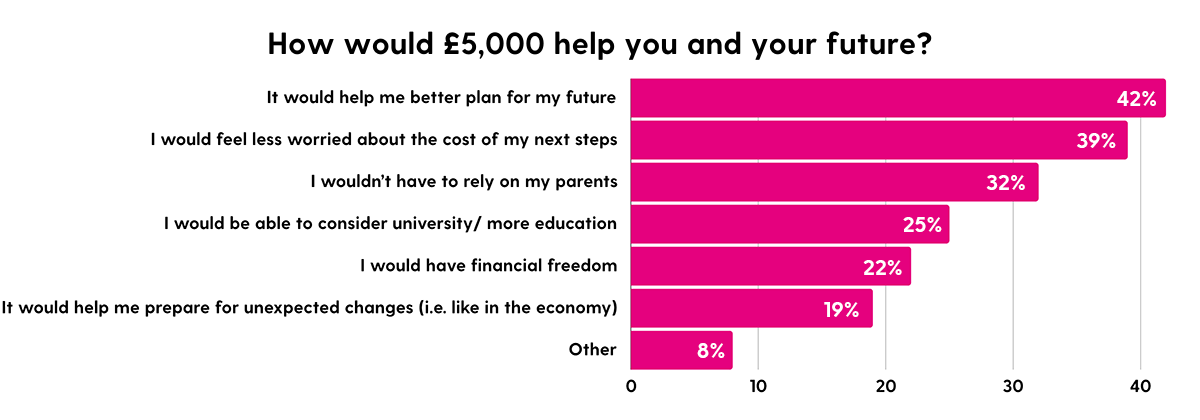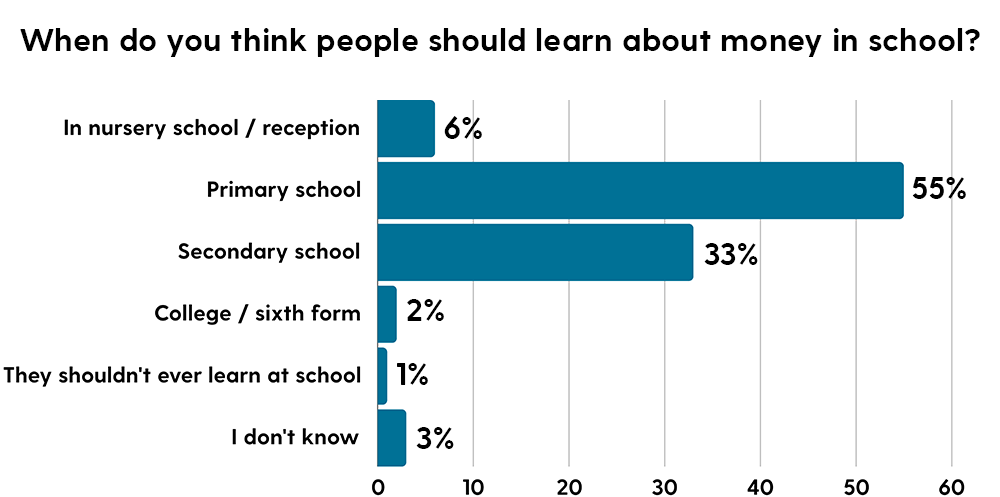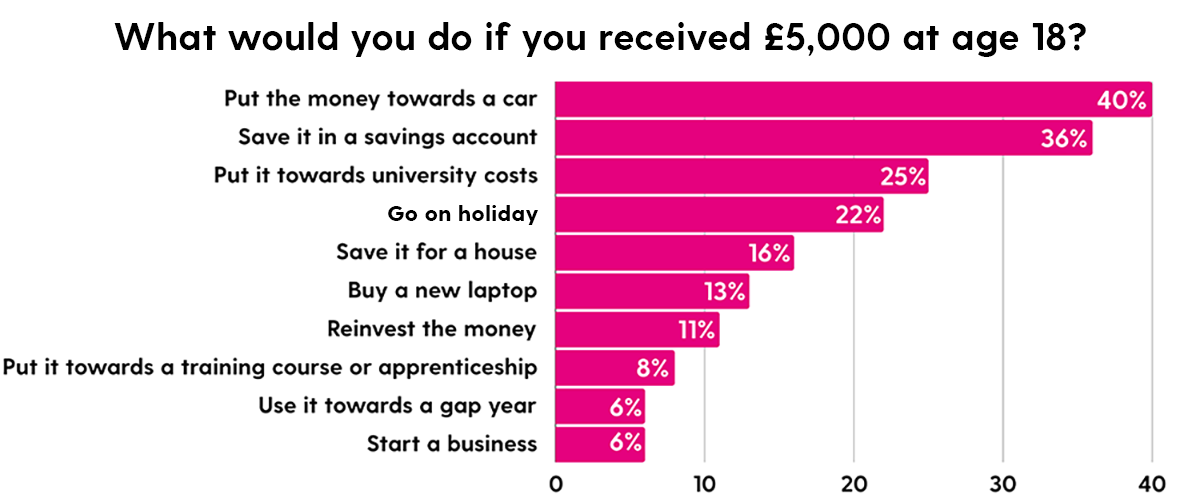What are Generation Z teenagers doing with their pocket money?
From saving money for the future to investing in stocks and shares, we asked “Gen Z” teenagers across the UK what they know, and how they feel, about money. Their answers might surprise you!
As a parent, it can be easy to assume that your children won’t be very interested in learning about long-term saving or the cost of household bills. The truth, however, is that they’re far more curious - and worried! - than you might think.
We asked 1,000 14-17 year olds from across all regions of the UK about money and found that not only would the majority rather save their money than spend it, but they’re also worried about future costs.
Are your children saving for the future?
Whether your teenager has a part-time job or they depend on you for pocket money, our research suggests that they’re much more likely to put it away for a future goal than to spend it on a day out.
In fact, a whopping 72% of Gen Z teenagers told us they try to save money when they can. This might not just be to buy themselves the latest expensive piece of tech, too. Over half of the children surveyed said that they’re worried about the cost of future life goals, such as buying a car or a house or paying for university.
While everyone said they were confident about their saving skills, with most having parents that encourage them to save, a third of the 14-17 year olds said they felt stressed when thinking about money.
In fact, when asked how they think getting a lump sum of money at 18 could help them, the responses showed that Generation Z teenagers are far more sensible than you might think.
Almost half said the money would help them plan for their future, with 39% simply saying it would help them feel less worried. Over a third are concerned about their financial independence, with many mentioning that money would help them rely less on their parents.

Do your children want to learn about money?
You might think your children only talk about money at home (if at all), but did you know over half discuss their finances with their friends?
While they’re more likely to bring up topics such as budgeting with parents, most teenagers still talk about their money worries with their friends, such as future savings, their income and even the cost of household bills!
You might be pleased to hear that taking the time to teach them about money management at home isn’t falling on deaf ears. As a generation concerned about money and saving for the future, they’re very interested in their own financial education, especially as only 40% said they learned about money management in school.
In fact, while most learned about money in secondary school, over half of the children we spoke to firmly believe that you should be taught about money as early as primary school, mentioning topics such as saving, budgeting, banking, financial planning, taxes and even planning for retirement.

What are Generation Z teenagers saving their money for?
It’s comforting to know that your children are planning for their own future but, as a parent, you might be curious about their saving goals.
As part of our survey, we asked Generation Z teenagers what they would do if they received £5,000 at age 18. Their goals may be much more long-term than you think!
While a few said they’d buy a new laptop, go on holiday or take a gap year, others were far more concerned with using that money to boost their chances of having a better life as an adult.
Many, for example, would like to continue their education after high school. A quarter of the teenagers we spoke to would put those £5,000 towards paying for university, with 8% mentioning training courses or apprenticeships instead.
Some are looking even further into the future and hoping to not have to pay rent when they move out, with 16% saying they’d use that money to start saving to buy their first home.
Even those who don’t have a clear financial goal are more interested in saving over spending. Over a third of all teenagers said that if they were given £5,000, they’d put that money in a savings account, and 11% chose to invest it instead.
The most common money goal, however, is the freedom to go wherever they want. 40% said they’d put that money towards buying a car.

How can you help your children plan for their future?
Since you now know your children are more likely to put money away than to spend it, you might feel tempted to give them a little bit more pocket money now and then. But have you thought about putting money away for their future on their behalf?
You might be put off doing so by worries that they’ll spend the money on short-term goals, but our research suggests teenagers today are far more sensible than older generations when it comes to money management!
Putting money in a savings or investment account for your children to access at 18 can not only give them the boost into adulthood they’re already planning for, but it can be a great way to start conversations about money and financial goals at home.
With a junior ISA, for example, the money stays locked away for the child until their 18th birthday, giving them plenty of time to decide what they’d like to do with it. They won’t pay any tax on the money they withdraw, regardless of how much it grows.
You can open a junior ISA for your child as long as they’re under 18 (under 16 for a OneFamily Junior ISA), and you can put in up to £9,000 each tax year. Of course, you don’t need to save as much as that. At OneFamily you can start building your child’s junior ISA from just £10 a month.
It’s never too late to start helping your child save for university costs, their first car or even a first home. Knowing they’ll have a lump sum to look forward to on their 18th birthday can give them the push they need to start making plans for their own financial future, and they might even ask you to put any pocket money you give them into their own junior ISA instead.

Our Junior ISA
With our stocks and shares junior ISA, you can up to £9,000 each year on behalf of a child.
Anyone can pay in, and your child will gain access to the account once they are 18 years old.
The OneFamily Junior ISA invests in stocks and shares. This means your money has good potential to grow over the long-term, but the value of your investments could go down as well as up and your child could get back less than you've paid in if they withdraw at a time when the value is lower.

Helping your teenagers with their finances
You may also be interested in:
Side hustles for teens
If you’re too busy for a part-time job, there are still many ways to get some extra money in your pocket as a teen, and we’ve listed some of the best ones.
How to encourage a balanced attitude towards money
The earlier children develop good financial habits, the less likely they are to get into debt when they’re older.
Children's Savings Guide
The earlier you start saving for your children, the more help they will have going into adulthood. Take a look at our guide to learn more about all the options available to you.
How to save money as a student
To help you get the most out of your time at university, we’ve put together some of the best ways to save money as a student.
